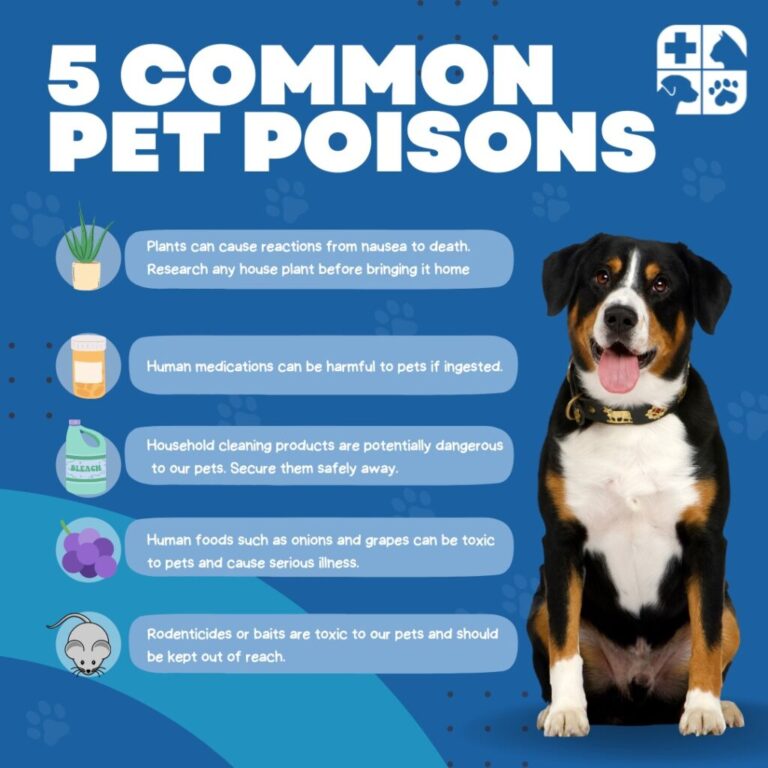My Pet Ate Something Toxic – Now What?

Authored by Robbyn Spinelli, LVT
Each year, thousands of cats and dogs suffer from accidental ingestion of household poisons. At Companion Pet Hospital, we have seen an increase in toxin ingestions, especially since the pandemic began. From an Easter Lily to a puddle of antifreeze, toxins come in all shapes and sizes. That’s why it’s important to be prepared! Here’s what you should do if your dog or cat gets into something she shouldn’t.
Don’t Panic!
It’s easier said than done, right? When you come home and find that your Labrador ate the entire plate of freshly baked brownies, your stress levels are likely to skyrocket. However, pets can sense our anxiety and react to a situation negatively. They may immediately try to run and hide, making it difficult for you to assess their condition. After taking a few deep breaths, and they haven’t already bolted, get your pet away from the toxin so they can’t ingest anymore of it. Clean up can come later! Safe places could include their crate or the bathroom for a brief period of time. If you have any other animals in the household, secure them in a separate space so they can’t come into contact with the toxin or your other trouble maker.
Assess the Situation:
Now that the dust has settled, it’s time to investigate and determine exactly what your pet ingested. The more information the better! Your Labrador that ate the brownies, what kind of brownies were they? Home baked or out of a box? Did you add anything to them, such as chocolate chunks? That type information will be important to relay to one of our veterinarians or to a medical professional from pet poison control.
Call Poison Control:
Pet owners have the ability to contact poison control for immediate assistance after their pet has ingested a toxin. We recommend calling the ASPCA Animal Poison Control Center OR the Pet Poison Helpline. These medical professionals have received extensive education in the areas of veterinary toxicology prior to their start of managing cases. They have clinical pharmacists and board certified veterinarians that have specialized in internal medicine, emergency/critical care, and toxicology. They will ask you a series of questions, including your pets personal details, any pertinent medical history or illnesses, and all of the information you have gathered regarding the toxin they ingested. Once you have spoken with poison control, they will provide you with a case number, which you will need to provide to one of our veterinarians. Our doctors will then call our friends at poison control and receive treatment advice throughout the entire course of your pets treatment. This ensures that your pet is getting great medical care and the best chance at a full recovery.
Don’t Wait to Seek Treatment:
If it is decided that your pet needs emergent medical care, don’t wait! Signs of poisoning can range tremendously, based on the toxin involved and how quickly pets receive help. While some toxins cause immediate symptoms, most cause damage that becomes apparent hours, days, or even weeks later. Common outcomes of untreated poisoning include gastrointestinal distress (vomiting and/or diarrhea), internal bleeding, and kidney or liver failure. It is also important to add that we don’t recommend treating your pet at home without medical advice from a veterinarian. Doing so can possibly worsen their symptoms or cause further damage to their body.
Avoiding Future Mishaps:
Take a few minutes to look around your house for toxins that your pets could be exposed to. Almost every room in your home has something with the potential to be poisonous. Consider installing child proof locks in your home, especially if your pet is good at breaking into things. Adding baby gates in doorways can also help keep your pet out of areas of the home that have dangerous items in them, such as the laundry room.
Consider Pet Insurance:
At Companion Pet Hospital, we are big advocates for pet owners investing in pet insurance. If your pet requires treatment or hospitalization due to a toxin ingestion, most insurance companies will cover the majority of your pet’s overall bill, saving you a lot of money. According to Trupanion pet insurance, they have paid $2.9 million toward toxicity claims for cats and dogs since 2013. Contact our office if you are interested in further information about pet insurances we recommend.
If you think your pet may have ingested a poison, please call us right away. All of our veterinarians at Companion Pet Hospital are trained to assist during a poison emergency and will let you know what steps to take. If something should happen to your pet after hours, please call one of the 24-hour hotlines listed below for immediate assistance. Consultation fees will apply.
ASPCA Animal Poison Control Center: (888) 426-4435
*Consultation fees will be waived for pets who have a registered and active HomeAgain microchip.*
Pet Poison Helpline: (855) 764-7661
101 Things You Didn’t Know Could Harm Your Pet: https://www.aspcapetinsurance.com/101-things-you-didnt-know-could-harm-your-pet/


